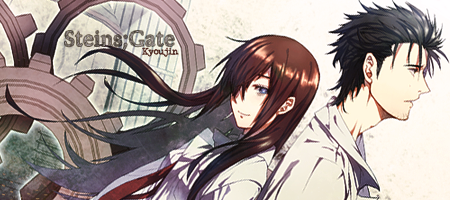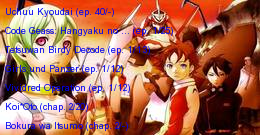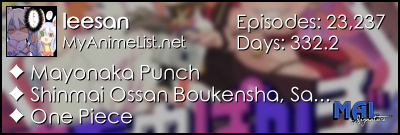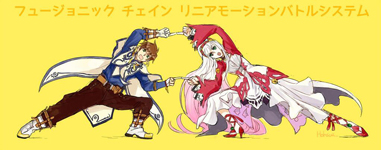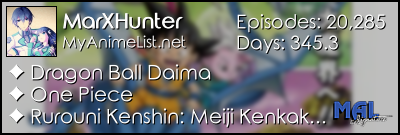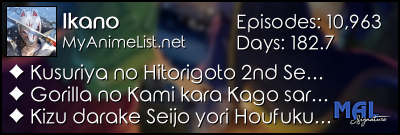That was a really good episode and, along with the twelfth, one of the strongest since the fourth, but, unfortunately, it served as a thoroughly mediocre, largely unsatisfying conclusion; an elongated encapsulation of the various dynamics that had been filtered into the story throughout the entire narrative, while concluding absolutely none of them, and offering, once again, little in the way of romantic development. As such, this episode wasn’t entirely cohesive in it’s approach to providing a satisfying and impressive conclusion, since the contrived attempts to force every single character into the episode, though somewhat welcome, felt strangely unnecessary, since, above all, Haru was practically non-existent, or, at the very least, far more isolated in the periphery than he should have been, save for the fantastic final scene. A heightened focus on the complicated intricacies within Haru and Shizuku’s relationship and a slight exploration of a loving resolution between them would have likely resulted in a much better ending to the show.
The best moment in this episode was Haru and Shizuku’s final conversation, in which they gaze towards the stars. The closing narration from Shizuku was a very nice parallel to the opening scene of the first episode and, though I felt several of her worries were somewhat naive, I loved the last line, in which she effectively stated that their relationship continues to possess a lengthy distance to traverse before arriving at some mutually understanding harmony, followed by her mentioning that, because she’s with Haru, the light of the insect, and, in turn, her future, appeared to be much, much brighter. Essentially, they’ve each heavily assisted towards the realization of an existence without considerable loneliness, essentially illuminating how their relationship has very beneficially extinguished the isolation that both once felt.
The only reason Yamaken’s appearance in this episode wasn’t entirely insufferable was due to the evident dichotomy that was illustrated between Shizuku’s interactions with him and the subsequent conversation she had with Haru, since these interactions beautifully accentuated the immense difference in their individual chemistry with Shizuku, as well as the contrast in her overall attraction towards them, with both emphasizing, yet again, the strength of Haru and Shizuku’s affections for one another, as well as the inevitable hopelessness of Yamaken’s interest in Shizuku. I was also really looking forward to Yamaken and Oshima’s inevitable rejections ever since they first appeared, so it’s rather disappointing that the narrative never reached that obvious conclusion.
Haru was a fantastic character, and, for the lead male in a shoujo, he was wonderfully unique. His socially awkward tendencies provided, for the most part, some excellent depth to his characterization. However, in several instances, primarily during the latter portion of the story, his appearances within an episode were strictly defined by his individualistic qualities, often to an unnecessarily exaggerated extent. This was true, of course, for many of the characters though, so it’s not a particularly significant criticism. Although Shizuku’s stubborn refusal to fully understand certain complexities that arose in her relationship with Haru was occasionally ridiculous, she was a great, well-defined character. I would have liked further development though, which I assume would have been pursued if the narrative was lengthier. As such, her cold, seemingly detached indifference towards their relationship, though quite rare and hardly intentional, often created an abundance of avoidable misunderstandings, and I would have preferred a slightly greater movement away from this flawed aspect of her characterization.
Haru and Shizuku’s relationship was one of the best aspects of the show throughout the first five episodes, and their interactions, for the most part, continued to be so afterward, but their development was predictably stalled and occasionally reverted throughout the following episodes, which was quite tedious. Although it was still compelling and highly interesting, due, in large part, to their immense chemistry and the mutually complex dynamic they possess, the perpetual stagnancy of it throughout nearly every single episode, save for the first three and the conclusion, was exceedingly tiresome, needlessly diverting from actual progress, since several seemingly meaningful developments were subsequently diminished by a needless reversion to previous inclinations. As such, though exceedingly simplistic, this flaw was somewhat remedied in the conclusive episode, as the development of Haru and Shizuku‘s relationship was quite satisfying, since, thankfully, it didn’t falter even further into a repetitious state of a fragmented understanding between both. However, these enjoyable interactions and the slightly meaningful development that occurred within Haru and Shizuku’s relationship should have existed in an earlier episode, such as the sixth, since this “conclusion” appears to be more of a natural extension to their early development, rather than a properly conclusive exploration of their romance.
The secondary characters were, for the most part, great. Natsume, in particular, was an excellently engaging character, and I loved the melancholic, yet highly realistic element of her isolated, seemingly troubled characterization that was subtly focused on during the scene in which she's deceitfully conversing through IM. Though I’m certainly expecting Mitsuyoshi to eventually reject Natsume’s confession, I would have liked to see that occur in this episode, despite the potential that it would appear to be an overly depressing conclusion for her character. The dynamic between Sasayan and Natsume was surprisingly terrific, as their relationship, though very subtle, felt entirely natural, as though the addition of a romantic component between them is a certain eventuality, while it also frequently allowed Sasayan to have a more prominent role, which was thoroughly welcome, since he’s a really good and surprisingly perceptive character. As such, I loved the small elements of romantic foreshadowing for Sasayan and Natsume throughout this episode and several others. Of course, these emotions are rather one-sided for the moment, but it seems that a relationship between them is quite inevitable. Haru’s interactions with Natsume provided some of the best and most consistently hilarious comedy throughout the entire show. Also, Yuu’s random appearances were highly amusing.
Yamaken was the worst “character”, by far. He was thoroughly unlikable and arrogantly manipulative, largely devoid of any singular aspect of his personality that was even marginally interesting. His monotonous inclusion in the narrative was entirely pointless, since, aside from the ability to selfishly interfere, he offered absolutely nothing of worth to the story. Not to mention, his interactions with Shizuku were considerably dull, since their highly similar personalities didn’t elevate the potential for an engaging dynamic, as, above all, their interactions were wholly absent of chemistry, only ever momentarily touching upon Yamaken’s denial of the feelings he harbors for a Shizuku he knows is well beyond his grasp. As such, Haru and Yamaken’s very rare interactions were far more interesting, though still a bit rudimentary in nature, since Yamaken’s not particularly complex. Essentially, a heightened focus on Yamaken’s deeply flawed perception of others in relation to himself would have been a rather insightful aspect of his characterization to partially explore, but, instead, what’s left is a prominence of his dreadfully lifeless feelings for Shizuku and his occasionally amusing, but increasingly repetitive, penchant for easily becoming lost.
Though the narrative improved considerably over the last two episodes, it was never quite able to reach the level of brilliance that was clearly present throughout the first five. Those episodes that fell in between detrimentally meandered for a significant portion of the narrative, as there was a lack of intriguing originality that made the early episodes comparatively unique. As such, the first five episodes were definitely the most impressive of them all, consistently unraveling a highly compelling and largely fantastic narrative; one that was initially suffused with terrific developments between Haru and Shizuku, as well as a superbly restrained focus on only a few secondary characters, which deftly managed to never interfere with the progression of the core narrative element. The latter half, by an unfortunate contrast, was intermittently painful to labor through, as the narrative consistently faltered into a dragging state of perpetual monotony, rarely elevating itself beyond a repetitive regurgitation of the stalled developments within Haru and Shizuku's relationship and a plethora of extremely flawed and weak attempts to convincingly portray Oshima and, in particular, the terrible Yamaken, as, inexplicably, important characters, when they never transitioned into anything of the sort. As such, the latter half of the show wasted a considerable amount of time masquerading Yamaken as some consequential character, when, predictably, all he amounted to was an irritating, comparatively one-dimensional third wheel, only deigning himself to interfere with a Shizuku that he continuously denied he had any feelings for, which was a tiresome repetition of banal affectations the very moment they appeared, and only managed to deteriorate even further as the story progressed.
The dramatic elements that were woven into the narrative weren’t entirely effective, since the majority of these intermittent complications, particularly throughout the latter half, felt quite insignificant and weightless, as, though well-foreshadowed, the complexities within these hindrances of progress weren’t satisfyingly examined. Of course, there were several nuanced and surprisingly introspective developments that occurred throughout the show, particularly Shizuku’s relationship with her mother or the occasional insight into Haru’s past and the fractured relationship with his brother, and even Natsume’s difficulties with her past, but, ultimately, these inferences of insightful substance into the characters were left woefully incomplete.
Essentially, the execution of the narrative was riddled with detrimental elements, especially following the introduction of Oshima and Yamaken, as the pacing often meandered. There was a lack of necessary momentum within the latter half of the narrative, and, in turn, an absence of effective development towards some sort of compelling climax. This, of course, is due to the apparently faithful adaptation of the accompanying material, which hasn‘t been concluded yet, but, unless there’s a second season, this approach to storytelling typically appears to be a thoroughly flawed one, since, much of the time, an inability to conclusively resolve a plethora of substantial developments within the story is quite inevitable, such as, in this case, Natsume and Sasayan’s seemingly inevitable relationship or her lingering feelings for Mitsuyoshi, Yamaken and Oshima’s intrusive involvement, and several aspects of Shizuku and Haru‘s relationship, which results in a story that is often, to an extent, unsatisfying.
The direction was solid throughout, as it effectively elevated several integral moments beyond their simplistic, potentially mundane intentions. The colorful aesthetic was very visually appealing, illuminating an atmosphere that really complemented the lighthearted nature of the material. Musically, the show was quite good, especially noticeable in several of the melancholic selections that typically accompanied reflections to the past. The animation was quite impressive throughout, albeit inconsistently, particularly in it’s ability to excellently portray the exaggerated reactions from many of the characters, which really benefited the humor.
All in all, Tonari was one of the best shows of this season, but also one of the most occasionally disappointing and frustratingly inconsistent, as it lingered for far too long on pointless, inevitably unresolved disruptions within the narrative that added absolutely nothing to the story. It excelled in many areas, especially notable in it’s mostly fantastic cast of characters and the wonderfully energetic atmosphere that heightened the effectiveness of nearly every aspect within each episode. The other elements, such as Yamaken’s perpetually unrequited and seemingly superficial “love” for Shizuku and Oshima‘s brief involvement within the story, were essentially meaningless and exceedingly simplistic, as every development within their evolving characterization and the relationships they pursued was suffused with a particular predictability that was quite disappointing and wholly unnecessary. Unfortunately, the abundance of conventional clichés was thoroughly detrimental to my overall perception of this once-incredible show. Despite my criticisms though, this was definitely interesting and consistently enjoyable, so I’m hoping for a second season, as it would likely resolve several of the inconclusive story threads in a much more satisfying manner.
An impressive, but somewhat disappointing 7/10 for me. |






